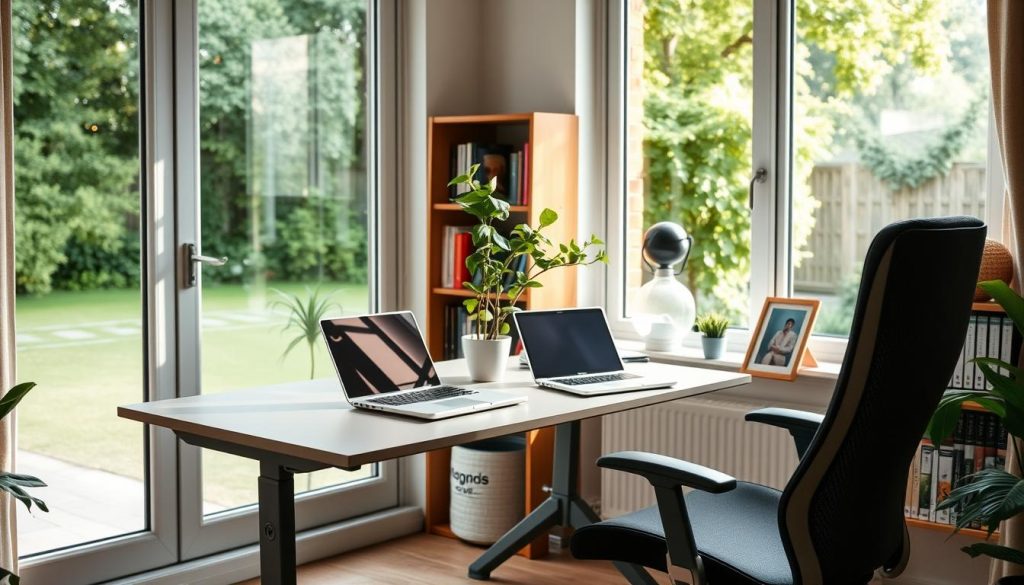In this article, we dive into the Belgian work culture, uncovering key insights. We focus on work-life balance and workplace etiquette in Belgium. Our goal is to provide useful information for both employees and employers.
We look at different parts of the Belgian work scene, like typical hours and employee rights. We aim to give you the tools to move smoothly through this unique setting. We also talk about communication styles and technology’s role in today’s workplaces. For more details, visit this resource on Belgian employment.
Overview of Work Culture in Belgium
The work culture in Belgium is a mix of hard work and personal happiness. It focuses a lot on work-life balance. This lets people enjoy their hobbies and work well, making them happier and more productive.
Importance of Work-Life Balance
In Belgium, work-life balance is a big deal. It’s seen in work rules and how people think. It helps keep people’s minds and bodies healthy, which is key for doing well at work.
Having a good balance makes people feel important and respected. Some key points are:
- Flexible hours that fit personal life.
- Plenty of holidays for family and personal time.
- Good parental leave to support families.
Cultural Diversity in the Workplace
Cultural diversity is a big plus in Belgium’s work world. With many languages and expats, there’s a wealth of ideas. This mix brings creativity and new ways of thinking.
It makes teamwork better and solves problems in new ways. It also makes people happier and more likely to stay at their jobs. Some benefits are:
- Teamwork gets better with different experiences.
- Diverse views lead to better problem-solving.
- Everyone feels welcome, leading to higher job satisfaction.
Typical Work Hours in Belgium
Belgium’s work hours give us a peek into its professional world. The standard week is 38 to 40 hours long. People usually work from 9 AM to 5 PM, aiming for a good balance between work and life.
Standard Working Hours
Belgian laws set clear work hours. Workers start around 9 AM and finish by 5 PM. This fits well with European norms, helping keep a healthy work-life balance.
Overtime Regulations
Overtime rules in Belgium are fair. They say workers can’t work too many extra hours without getting paid more. This rule helps keep workloads manageable and work environments healthy.

Communication Styles in Belgian Workplaces
Understanding how people communicate in Belgium is key for anyone working there. Belgians like to be direct in their talks. This isn’t just about being blunt; it’s about wanting clear and respectful communication at work.
By being direct, we create a space where everyone can be open and work well together.
Importance of Directness
In Belgian workplaces, being clear is valued. Both employees and managers respect those who speak their minds clearly. This makes it easier to understand what’s expected and avoids confusion.
It also helps teams work better together.
Cultural Nuances in Communication
Belgium’s mix of languages makes communication even more complex. French, Dutch, and German are used in different areas and workplaces. It’s important to be aware of these differences.
Also, paying attention to body language is key. It helps send messages in the Belgian work culture.
Hierarchical Structures in Companies
In Belgium, companies have both tall and flat structures. This mix helps them use different management styles. It makes the workplace better for everyone, boosting happiness and teamwork.
Management Styles
Belgium’s management styles vary a lot. There’s a big move towards making decisions together. This approach makes everyone feel included and builds strong team bonds.
By using these styles, companies show they value what their employees say. This creates a positive work culture.
Employee Autonomy
Belgium’s company hierarchy is flexible, giving employees a lot of freedom. They can share their ideas freely and help make big decisions. This freedom makes them happier and more creative at work.

The Role of Unions and Worker Representation
In Belgium, unions play a key role in protecting worker rights. They are a vital part of the labour scene, giving workers the support and advice they need. By understanding unions, we see how they help shape policies and defend workers’ interests in different fields.
Understanding Union Influence
Unions in Belgium are key in making collective agreements that improve working conditions. They fight for fair pay, decent working hours, and the well-being of employees. By working together, unions shape laws and help in discussions about work rights. This lets workers express their needs and get the help they deserve.
With union support, workers learn about their rights and what they are entitled to at work.
Employee Rights and Protections
Belgium has strong worker rights, thanks to unions. Unions are essential in making sure laws are followed and workers are protected. They spread the word about important rules, like health and safety and anti-discrimination laws. Knowing their rights, workers can handle problems better and get help when needed.
Unions help create a culture where workers are active and aware of their rights. This shows how important worker rights are in Belgium.
Punctuality and Professionalism
In Belgium, being on time is very important at work. It shows we value our time and respect others. If we’re late, it can hurt our relationships with colleagues and clients.
Expectations around Timeliness
Belgian workplaces expect everyone to be on time. Showing up for meetings and deadlines on schedule is key. It shows we’re reliable and professional. Employers and colleagues notice and appreciate this.
Here are some key points about being on time:
- Arriving on time for meetings helps discussions flow well.
- Meeting deadlines shows we’re responsible and reliable.
- If we’re going to be late, telling others in advance is polite.
Professional Conduct
Being professional in Belgium is more than just being on time. It’s about how we act and treat others at work. Key parts of being professional include:
- Respecting everyone, no matter their role.
- Following the rules of good communication at work.
- Being polite and respectful in all interactions.

Lunch Breaks and Social Interaction
Lunch breaks in Belgium are a big part of work culture. They last from 30 minutes to an hour. This time is perfect for taking a break and getting to know our colleagues better.
Duration of Lunch Breaks
Lunch breaks in Belgium can vary. But most employers want us to use this time wisely. It’s a chance to talk about work or personal things, making our day better.
Importance of Networking
Lunch breaks are great for networking at work. They help us connect and work better together. Building these relationships makes our work environment positive and supportive.
Dress Code Norms in Belgian Companies
Knowing the dress code in Belgium is key for anyone working here. It changes a lot based on the job, affecting what people wear to work.
Casual vs. Formal Attire
In big companies, dressing formally is often the rule. This means suits and clean shoes. It shows you’re serious about your job, which is important when you meet clients.
But, in places like media and tech, things are more laid-back. Here, you can wear casual clothes. This lets you show your style at work.
Industry-Specific Dress Codes
Belgium has many jobs, each with its own dress code. For example, finance and law want you to dress up. But, in retail and hospitality, you might wear uniforms or smart-casual clothes.
Knowing what to wear before you start a job helps you fit in better. For more info on working in Belgium, check out this useful guide.
Innovations and Flexibility in Work Practices
Belgium has seen big changes in work habits, thanks to remote work and flexible hours. New tech and a focus on work-life balance have led to more flexible work setups. This change makes employees happier and more productive.
Remote Working Trends
Remote work in Belgium has changed how we work. Companies now let people work from home, helping them balance work and personal life. This is key in today’s busy world.
Flexible Hours
Flexible hours are now common in Belgium. Employers see the value in flexible schedules that meet each person’s needs. This approach boosts job happiness and cuts down on stress, helping everyone.
How Belgium Supports Work-Life Balance
In our look at work-life balance in Belgium, we find many family-friendly policies. These help improve employee well-being. They also boost productivity at work.
Family-Friendly Policies
Belgium really focuses on family-friendly policies. This is seen in many parts of work life. For example:
- Generous parental leave for new parents.
- Flexible scheduling to fit personal needs.
- Help with childcare, making it easier to balance work and family.
These policies are key for keeping a good work-life balance as we work.
Vacation Entitlements
Belgium also offers great vacation time. Most workers get at least four weeks off each year. This break is vital for coming back to work refreshed and ready.
Having time off helps us manage our work and personal lives well. For more on how this shapes work culture, check out supportive resources on Belgian work policies.
These policies make employees more productive and happy. This leads to a more engaged workforce across the country.

Diversity and Inclusion Initiatives
In today’s work world in Belgium, companies are focusing more on diversity and inclusion. Having people from different cultures makes our workplaces better and more innovative. This shows how much value a diverse team brings.
This approach helps everyone work together better and share different ideas. It’s all about creating a place where everyone feels valued and heard.
Embracing Multinational Workforces
Having teams from around the world makes our work environment richer. It brings a lively atmosphere that encourages teamwork. This way of working makes everyone feel like they belong.
It also helps us reach our goals as a company. The main benefits are:
- More creativity and new ideas from different views
- Better at solving problems together
- Happier employees who stay longer
Gender Equality in Employment
Gender equality is key in our mission to create inclusive workplaces in Belgium. We aim for equal chances for everyone and support policies for gender balance. This shows our dedication to fairness and respect in work.
True equality means:
- Equal pay for all
- Flexible work options for everyone
- More leadership roles for women
Learning and Development Opportunities
In Belgium, there’s a strong focus on professional growth. A solid system supports ongoing learning. Many companies put a lot of effort into helping employees improve their skills.
This focus on professional development Belgium makes a culture where growing personally is important.

Employers know how vital training is. They offer many ways to develop skills, such as:
- Workshops for specific skills
- Online courses for flexibility
- Mentorship programmes for new staff
- Industry certifications to boost expertise
People say these learning opportunities in Belgium help a lot with their careers. They get real skills and knowledge that help them move up. Funding for startups in Belgium also helps with these training efforts, making more resources available.
By investing in training, we build a workforce that’s always learning and adapting. This boosts the economy and helps everyone grow in their careers. It makes the most of what Belgium has to offer.
Employee Benefits and Compensation
Understanding the compensation structure in Belgium is key for starting a business here. Employee benefits are vital for attracting and keeping top talent. A good compensation plan includes not just salaries but also extra perks for employee well-being.
Salary Structures
Salaries in Belgium are often competitive, showing the country’s dedication to fair pay. Companies consider several things when setting salaries:
- Experience level of employees
- Industry standards and benchmarks
- Cost of living adjustments
- Job role and responsibilities
This ensures that employee benefits in Belgium match well with salaries. Clear salary ranges can boost employee motivation and trust in the workplace.
Common Benefits Offered
Companies in Belgium also offer various benefits to improve job satisfaction. These include:
- Health insurance plans
- Retirement savings schemes
- Annual bonuses based on performance
- Flexible working arrangements
- Extended holiday leave
These benefits are key to a supportive work environment. When setting up a company in Belgium, remember these benefits for your workforce’s long-term success and happiness.
The Role of Technology in the Workplace
In today’s work world, technology’s role in Belgian workplaces is huge. Companies are using digital tools to make teamwork better and processes smoother. This shows how important being connected and efficient is, as more people work from home.
Tools Utilised for Collaboration
Belgian companies use many tools to help teamwork. These include:
- Project management software like Asana and Trello, for keeping track of tasks and deadlines.
- Communication tools like Slack and Microsoft Teams, for easy team chats.
- Cloud storage solutions such as Google Drive and Dropbox, for sharing files easily.
These digital tools make working together better, for both those in the office and those working from home.
Impact of Digitalisation
Digital tools have changed how we work in Belgium. They help make work more productive and efficient. Digitalisation has brought:
- Better communication, helping remote and office workers stay in touch.
- More efficiency, by automating simple tasks so teams can work on important projects.
- More flexibility, making it easier to adjust to different work situations.
Seeing how digital tools affect Belgium shows us new chances for growth. To learn more about Belgian business practices, check business requirements in Belgium.
Conclusion: Embracing Belgian Work Culture
Exploring Belgian work culture shows us its importance for employers and employees. The focus on work-life balance makes our days better. It’s key to adapt to these norms.
The different ways people communicate at work make everyone feel included. This helps us build strong bonds with our colleagues.
Final Thoughts on Adaptability
Understanding Belgian work culture improves our work life. It makes our jobs more satisfying. By embracing this culture, we help our workplaces grow.
Adaptability is essential. It lets us succeed in a place that values both work and personal life. This way, we can do well and feel good at the same time.







